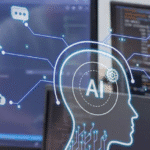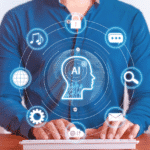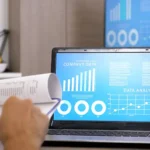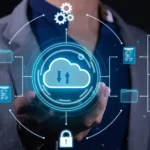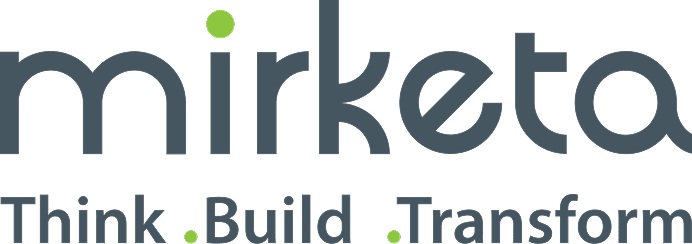ERP vs CRM: Everything You Need to Know
Author
October 4, 2021
Enterprise Resource Planning (ERP) and Customer Relationship Management (CRM) are the two primary software solutions companies use to automate their core business processes. Though these tools cater to different needs of business functions, most people get confused about their needs, functionalities, features, and outputs. ERP focuses mainly on integrating and managing business processes like accounting, project management, procurement, and supply chain operation. In contrast, CRM focuses on business interaction with the customer throughout the business journey. Businesses may need ERP, CRM, or both as per their functional needs and business requirements.
What is ERP?
Enterprise Resource Planning (ERP) is software that is used to manage day-to-day business processes and activities. ERP enables the data flow through multiple business processes to make the cross-functionality of work processes seamless. This helps the system to be a single source of truth for data and data duplicity can be avoided. ERP works as a shared database for all business processes in an organization like Finance, Accounts, Supply Chain Management, Order Management, and Inventory Management. With the universal nature of the data, all parts of the organization get a real-time view of the data. Any change in the data will be notified to all the related business processes. Any issue in the process can be alerted to all the affected business processes and according to which required planning can be done based on real-time data. For example, a mold manufacturing company procures the standard parts from multiple suppliers. Throughout its process journey, the procured item will be identified with a unique name, part number, dimensions, quantity of lot, cost, and other specifications. The availability of this uniform information on software will help to avoid confusion and misleading information. ERP makes it easier for the system to collect, plan, manage, and organize the data related to resources.
Benefits of an ERP system:
- Enhanced Collaboration and Workflow
As the ERP behaves as a common source of truth for all the data shared across multiple parts of an organization, the collaboration among cross-functional teams becomes effective. Seamless workflow along with the data flow can be developed with the help of an ERP system.
- Improved Business Processes
ERP systems are designed to follow the best-standardized practices, which helps in improving the efficiency of the business processes. With automation in business processes, the errors can be reduced, which enhances productivity.
- Better Data Quality & Security
With the help of ERP, one can control and secure the data with the permissions for create, edit and delete data in the system. With ERP being the single source of truth for data, the accuracy, transparency, and quality are improved.
- Improved Planning & Reporting
As the ERP behaves as a common source of truth for all the data shared across multiple parts of an organization, it can generate reports for multiple departments. With the unified reporting system, the data and reporting consistency can be maintained.
What is CRM?
Customer Relationship Management (CRM) is a tool that helps businesses to interact with their existing and future potential customers. This tool encapsulates the whole customer journey, from capturing the lead to the conversion of the lead. CRM is a data-driven tool, which analyses customer data to build, maintain and nurture relationships with customers. CRM is used to store all the information about different customers, like details of accounts and contacts, systematically and in a structured manner that can be easily accessible for different purposes. CRM helps businesses to track lead status, identify potential opportunities, schedule tasks, manage multiple campaigns, and manage different cases on a single platform. With the help of CRM, one can make reports with ease with the available customer data and get the visuals of all data according to requirements with filters. CRM also provides analytics which helps a business make an informed decision and plan future activities accordingly. CRM can also be integrated with other tools and software like billing processing, accounting, and resource planning, which can help businesses maintain seamless data flow and provide businesses with 360-degree information about customers. Salesforce is the leader in the CRM market with around 20% market share, followed by SAP and Oracle, which have around 5% market share.
Benefits of CRM:
- Enhanced Collaboration
CRM can work as a single source of customer data for an organization. With the shared data to all the team members working on a CRM platform, the changes made in the records will be updated for everyone and everyone can work on the real-time updated data.
- Reports and Dashboards
Data being one of the main aspects in businesses, reporting plays a vital role in getting essential insights from the bunch of data. CRM helps an organization to collect, maintain and organize the data to get different types of reports. With the customized dashboards, an organization can set up customized dashboards for different personas wanted to track different information.
- Improved Efficiency with Automation
With automation, an organization can cut down the time required in multiple activities. Workflows and triggers can be helpful to schedule the upcoming task and series of activities without manual intervention. Time can be reduced in emailing the customers with standard templates.
- Data Security
Data can be secured with the help of multiple layers of security. CRM can help an organization secure its data with a multi-factor authentication system to avoid unauthorized access to the system. Internally, with the help of permission and permission sets, an organization can restrict access to the data to different personas.
ERP or CRM?
We have discussed all the functions and benefits of ERP and CRM tools. Now the question arises, what software should a company opt for? Any growing business or industry that relies on traditional methods for handling financial and customer-related data will feel the need for ERP and CRM in the future. Many people make a common misconception that CRM tool is used only by companies or businesses focused on Sales and Marketing and manufacturing industries do not need CRM tools and only ERP is sufficient. But with the dynamic nature of demands, real-time data analysis, forecasting, and customer interaction has become essential, in which CRM can play a vital role. For example, Salesforce Manufacturing Cloud covers all the basic needs of Manufacturing industries along with the CRM features. It has features like Sales agreement, Account-based forecasting, and Einstein Analytics which can be helpful for a manufacturing company to have real-time updates on forecasting and analytics. Eventually, both ERP and CRM are essential, and companies can make an informed decision considering the alignment of software benefits and company requirements.
Conclusion
Both ERP and CRM systems serve different functions and can be helpful to industries for different requirements. As more companies focus on automation and getting better results from it, most industries will be needing both systems in the long run. The small and medium scale industries, which are currently handling their financial and customer-related data on spreadsheets, will be needing these systems as the business grows. Now the question remains, for the industries having the requirements from both the systems, is it possible to integrate ERP and CRM? And the answer is YES. You can know more about ERP and CRM integration in our upcoming blogs. Stay Tuned.
Recent Posts
-
 Salesforce API Testing – The Modern QA Approach for Reliable Integrations05 Jan 2026 Blog
Salesforce API Testing – The Modern QA Approach for Reliable Integrations05 Jan 2026 Blog -
 Transforming SMB Sales with Salesforce Commerce Cloud12 Nov 2025 Blog
Transforming SMB Sales with Salesforce Commerce Cloud12 Nov 2025 Blog -
 Generative AI Testing tools03 Nov 2025 Blog
Generative AI Testing tools03 Nov 2025 Blog -
 Mirketa Unveils Next-Gen AI Solutions to Redefine the Future of Work Across Industries29 Jul 2025 Press Release
Mirketa Unveils Next-Gen AI Solutions to Redefine the Future of Work Across Industries29 Jul 2025 Press Release -
 Salesforce Implementation School Universities Higher Education23 Jul 2025 Blog
Salesforce Implementation School Universities Higher Education23 Jul 2025 Blog -
 Salesforce Health Cloud Implementation Partner: A Complete Guide23 Jul 2025 Blog
Salesforce Health Cloud Implementation Partner: A Complete Guide23 Jul 2025 Blog -
 XML Parsing: Using MINIDOM Vs Element Tree (etree) in Python02 Jul 2025 Blog
XML Parsing: Using MINIDOM Vs Element Tree (etree) in Python02 Jul 2025 Blog -
 A step by step Guide to create Salesforce web-to-lead form30 Jun 2025 Blog
A step by step Guide to create Salesforce web-to-lead form30 Jun 2025 Blog -
 How AI is Transforming User Experience Design in 202526 Jun 2025 Blog
How AI is Transforming User Experience Design in 202526 Jun 2025 Blog -
 How a Salesforce NPSP Consultant Can Elevate Nonprofit Impact25 Jun 2025 Blog
How a Salesforce NPSP Consultant Can Elevate Nonprofit Impact25 Jun 2025 Blog -
 Salesforce Load and Performance Testing: Essentials, Importance & Execution23 Jun 2025 Blog
Salesforce Load and Performance Testing: Essentials, Importance & Execution23 Jun 2025 Blog -
 Salesforce Website Integration Boost Leads, Automation & Customer Experience11 Jun 2025 Blog
Salesforce Website Integration Boost Leads, Automation & Customer Experience11 Jun 2025 Blog -
 Driving Results in Manufacturing with Salesforce Manufacturing Cloud11 Jun 2025 Blog
Driving Results in Manufacturing with Salesforce Manufacturing Cloud11 Jun 2025 Blog -
 Accelerating Growth with NetSuite SuiteCommerce02 Jun 2025 Blog
Accelerating Growth with NetSuite SuiteCommerce02 Jun 2025 Blog -
 Salesforce Service Cloud Services streamlining operations29 May 2025 Blog
Salesforce Service Cloud Services streamlining operations29 May 2025 Blog -
 AI for Nonprofits: Mirketa & Exec Precision Webinar27 May 2025 Press Release
AI for Nonprofits: Mirketa & Exec Precision Webinar27 May 2025 Press Release -
 AI for Nonprofits: Use Cases, Tools & Implementation Strategies20 May 2025 Webinar
AI for Nonprofits: Use Cases, Tools & Implementation Strategies20 May 2025 Webinar -
 Javascript Frameworks for Salesforce Lightning Design System18 May 2025 Blog
Javascript Frameworks for Salesforce Lightning Design System18 May 2025 Blog -
 Building a Smart Campus with Salesforce Student Information System: A Road to Smarter Education16 May 2025 Blog
Building a Smart Campus with Salesforce Student Information System: A Road to Smarter Education16 May 2025 Blog -
 Salesforce Nonprofit Cloud: Benefits & Consultant Role15 May 2025 Blog
Salesforce Nonprofit Cloud: Benefits & Consultant Role15 May 2025 Blog


